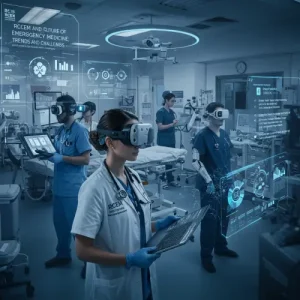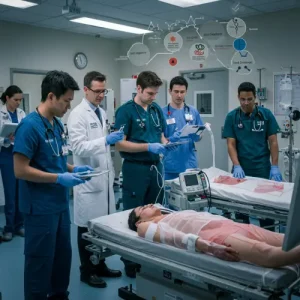Emergency medicine is an essential and fast-evolving field, where rapid decision-making, clinical expertise, and cutting-edge technologies are critical to providing life-saving care. As the demands and challenges of emergency medicine continue to grow, so does the need for innovative solutions, better patient outcomes, and more efficient processes. This is where research plays a pivotal role—helping to transform practices, improve care, and address emerging challenges in emergency departments (EDs) across the world.
In the UK, the Royal College of Emergency Medicine (RCEM) is at the forefront of fostering and supporting emergency medicine research. Through its dedicated research programs, partnerships, and initiatives, RCEM plays a crucial role in driving forward innovation and advancing the specialty. This blog will explore how RCEM supports emergency medicine research, facilitates innovation, and promotes evidence-based practices that ultimately enhance patient care.
1. RCEM’s Commitment to Research in Emergency Medicine
RCEM recognizes the importance of research in advancing emergency care. Research is vital for discovering new treatment methods, improving patient management, and addressing the unique challenges of emergency care delivery. As part of its mission, RCEM promotes research initiatives that allow for the continuous evolution of practices and protocols within the field.
The College plays an instrumental role in promoting evidence-based clinical practice, which is grounded in the latest research findings. By encouraging and supporting high-quality research, RCEM ensures that emergency medicine remains a dynamic and evidence-driven specialty, focused on improving patient care and outcomes.
2. RCEM Research Strategy and Focus Areas
RCEM’s research strategy is designed to support the development of new knowledge and innovations across various domains within emergency medicine. The College focuses on several key areas of research, including:
- Clinical outcomes and patient safety: Research into improving patient outcomes, reducing mortality, and minimizing harm in emergency settings is central to RCEM’s work. This includes studies on better diagnostic accuracy, early intervention strategies, and enhanced care pathways for critically ill patients.
- Pre-hospital care and urgent care services: RCEM supports research into pre-hospital emergency medicine, including studies on ambulance services, paramedic care, and urgent care clinics. These initiatives aim to optimize care before patients reach the emergency department and improve overall system efficiency.
- Trauma care and resuscitation: Trauma is a leading cause of death and disability worldwide, and RCEM is involved in numerous studies aimed at improving trauma care protocols, resuscitation techniques, and multi-disciplinary collaboration in trauma management.
- Mental health and emergency care: As mental health emergencies become increasingly prevalent in the ED, RCEM supports research into best practices for managing mental health crises in the emergency setting, including studies on de-escalation techniques, patient referrals, and interdisciplinary care.
- Health technology and digital innovation: RCEM recognizes the importance of technological advancements in improving emergency care. The College encourages research into the integration of digital tools such as telemedicine, artificial intelligence (AI), and predictive analytics into emergency care workflows.
These focus areas reflect RCEM’s commitment to improving every aspect of emergency care, from the clinical to the systemic, to ensure that patients receive the best possible outcomes.
3. RCEM Research Collaborations and Partnerships
RCEM actively collaborates with a wide range of academic institutions, healthcare providers, government organizations, and industry partners to advance emergency medicine research. These partnerships are key to facilitating multi-disciplinary research efforts that push the boundaries of what is possible in the field.
The College has established strong ties with academic researchers in emergency medicine, public health, and healthcare policy, as well as with leading institutions such as universities, hospitals, and research networks. These collaborations enable RCEM to conduct large-scale research studies, share resources and expertise, and promote the dissemination of findings across the wider medical community.
Additionally, RCEM works closely with NHS organizations to implement findings from research directly into clinical practice, ensuring that new innovations are swiftly integrated into real-world emergency care settings.
4. Research Funding and Grants
In order to facilitate and support innovative research in emergency medicine, RCEM provides research funding and grants to researchers and institutions. These financial resources are used to support both large-scale studies and smaller, exploratory projects that can lead to breakthrough discoveries.
Through its RCEM Research Fund, the College has been able to sponsor a variety of important research initiatives, from studies on early warning systems for sepsis to research on improving patient triage methods in busy EDs. By investing in research, RCEM helps to ensure that the field of emergency medicine has the resources it needs to continue evolving.
These funding opportunities are especially important in a field where urgent care and treatment protocols are constantly being refined. The research supported by RCEM helps provide a solid foundation for evidence-based clinical guidelines and informs the development of national policies in emergency care.
5. RCEM Research Events and Conferences
RCEM also organizes and supports various events, including conferences, workshops, and research symposia, where healthcare professionals, researchers, and academics can come together to present their latest findings, share ideas, and discuss the future of emergency care.
These events provide valuable networking opportunities for emerging researchers and established experts alike. They offer a platform for presenting research projects, discussing challenges, and fostering collaboration across different sectors of the healthcare system. Through these initiatives, RCEM contributes to the creation of a vibrant research community that is dedicated to advancing emergency medicine.
6. Promoting Early Career Researchers
RCEM is dedicated to supporting the next generation of researchers in emergency medicine. The College recognizes that fostering early career researchers is crucial for ensuring the long-term growth of the specialty. RCEM provides mentorship, training, and opportunities for young professionals to engage in research projects and collaborate with experienced researchers.
By providing early career researchers with the tools and resources they need to succeed, RCEM helps build a strong foundation for future innovations in emergency care. This commitment to the development of new talent ensures that emergency medicine continues to thrive and adapt to the changing needs of patients and healthcare systems.
7. Impact on Patient Care and the Future of Emergency Medicine
Ultimately, the goal of RCEM’s research efforts is to improve patient care and health outcomes. By supporting research into better diagnostic techniques, more effective treatments, and enhanced care pathways, RCEM is contributing to the development of a more responsive and effective emergency care system.
Moreover, RCEM’s focus on innovation—whether in the form of new technologies, improved clinical processes, or novel approaches to patient care—ensures that emergency medicine is always evolving. This constant drive for improvement not only benefits patients in the UK but also sets a global standard for emergency care.
Conclusion
The Royal College of Emergency Medicine plays an integral role in supporting research and driving forward innovation within the field of emergency medicine. By promoting evidence-based practices, fostering research collaborations, and providing funding and support to researchers, RCEM helps shape the future of emergency care.
As the challenges faced by emergency departments continue to evolve, RCEM’s commitment to research will remain a cornerstone in advancing the specialty. Through its ongoing efforts to support research, RCEM is helping to improve patient outcomes, enhance the quality of care, and ensure that emergency medicine remains a dynamic and responsive field.




